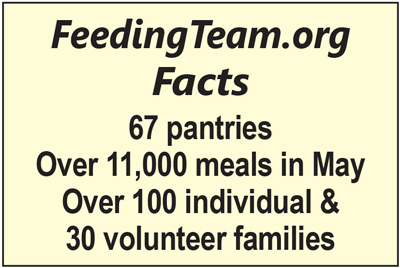It’s one thing to crave a butter burger or a bottomless bag of my favorite snacks – let’s say, chocolate-dipped Oreos. It’s another thing altogether to be so famished that you are irritable and overreact to minor annoyances.
That’s the difference between being hungry and being “hangry,” a clever combo of “hungry” and “angry.”
“There is a physiological reason why some people get angry when they’re hungry,” says Cleveland Clinic gastroenterologist Christine Lee, MD. When you haven’t eaten for a while the sugar in your blood decreases, she explains. When your blood sugar gets too low, it triggers a cascade of hormones, including cortisol (a stress hormone) and adrenaline (the fight-or-flight hormone). These hormones are released into your bloodstream to raise and rebalance your blood sugar.
So why am I so hangry? “The release of cortisol can cause aggression in some people,” says Dr. Lee. “Also, low blood sugar may interfere with higher brain functions, such as those that help us control impulses and regulate our primitive drives and behavior.”
So, there truly is a medical explanation for being hangry. It’s a biochemical reaction due to low blood sugar – not the same thing as being crabby when you’re tired, sick, or otherwise feeling out of sorts.
Now that an expert has weighed in, hunger-related anger is on my heart, and here’s why.
This week, a group of five neighbors stopped by to pick up food from the pantry at the office. A family stopping by isn’t rare; in fact it’s quite a regular occurrence.
What makes this situation unique is when one of the five came to the door, knocked, and once the door was opened, berated the volunteer with a loud angry tirade, swearing and demanding more food: “YOU NEED TO GO GET ME A BOX OF FOOD, RIGHT NOW!!! THIS (EXPLETIVE) FOOD IS (EXPLETIVE) FREE!!! I NEED TO TAKE IT WITH ME!” Clearly upset, she couldn’t control her fury and took it out on the very same people that provide no-questions-asked meals for her and her family. As the confrontation was occurring, the four others gathered up almost every meal in the pantry.
As a rule, we won’t interact with neighbors at a pantry unless they speak first. Our volunteer felt threatened as she tried to defuse the situation and explained that we aren’t built to provide a volume of many meals to individuals, rather we provide a few meals to as many as possible to help families get by. Further, the volunteer referred the neighbor to two places where she could get a larger amount of help for her family. In the moment, our visitor noticed the security camera pointed directly at her face. Her pause allowed the alarmed volunteer a moment to calm the situation by quickly shutting and securing the door. The group of five left shortly after with as many meals as they could carry.
The entire episode has me thinking about and researching the connections between aggressive behavior and hunger. That led to this month’s column. Click here for more on “hangry” in a June 2021 article by the Cleveland Clinic.
Are our hungry neighbors more apt to be aggressive? Reflecting on 20-plus years of food charity work, the short answer is yes, sometimes. Anger and shame are two of the potential consequences of hunger. I am not condoning the anger nor am I of the belief that a hungry neighbor should feel shame. Unfortunately, it can be the reality of a personal situation: the world is not a fair place.
The neighbor was clearly out of line. The economy being what it is, more neighbors are struggling. Hunger is real and dealing with angry hungry neighbors is as real as it gets. People aren’t entitled to receive Feeding Team’s help; we give it freely to the best of our ability. Further, we encourage as much grace as possible as a response to “hangry” situations.
That’s the takeaway, and that’s the lesson from this week’s situation. There but for the Grace of God go all of us, kindness to our neighbors never goes out of style, but abuse and threats are not acceptable. The safety of our volunteers will not be compromised.
* * *
 Feeding Team provides a way and a place for those in need to get food for their family. While each pantry really is just a big wooden yellow box, it means so much more for donors and for families in need. You are welcome to join us as together we fight to eliminate hunger in Hamilton County.
Feeding Team provides a way and a place for those in need to get food for their family. While each pantry really is just a big wooden yellow box, it means so much more for donors and for families in need. You are welcome to join us as together we fight to eliminate hunger in Hamilton County.
With over 40,000 food-challenged neighbors in Hamilton County, FeedingTeam.org is a registered 501(c)(3) not-for-profit organization that provides outdoor 24/7/365 no-questions-asked free food pantries throughout the county.
The pantries exist to meet the food insecurity needs of gap families, neighbors who may not qualify for public assistance and could use a few meals before payday. The pantries serve as many food-challenged neighbors as possible, and our hearts are with those who, like my family, could not always make ends meet.
Thank you for supporting the pantries. We love serving with so many neighbors across Hamilton County. In future columns, we will share more stories about how your generosity served neighbors in times of need. The face of hunger in Hamilton County is not what you may think.
In practical terms, this straightforward way to help neighbors is having real impact on lives, families, and our communities. Thank you. A few meals can change the course of a person’s life. A can of green beans means so much more when you have nothing to feed your kids.
Would you like to get involved? Volunteer opportunities are available. We are evaluating new pantry locations. If you think you have a potential location, please contact us.
Mark and Lisa Hall are the Founders of Feeding Team. They may be reached at lisa@feedingteam.org and mark@feedingteam.org or by calling (317) 832-1123.

